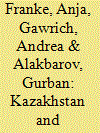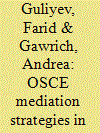| Srl | Item |
| 1 |
ID:
086242


|
|
|
|
|
| Publication |
2009.
|
| Summary/Abstract |
This article presents an analysis of two post-Soviet states, Kazakhstan and Azerbaijan, which can be identified as post-Soviet rentier states. Both countries are characterised economically by enormous national resources of gas and oil and low economic diversification as well as politically by strong autocratic presidentialism with neopatrimonial structures. These two factors, combined with further post-Soviet legacies such as a low level of political interest in the respective societies and a basically hierarchical orientation of the population, lead to a specific post-Soviet variety of rentierism. From a political science perspective, this article reveals the impact of resource policies on these comparably new political systems and concludes with a summary of core features of these post-Soviet rentier states.
|
|
|
|
|
|
|
|
|
|
|
|
|
|
|
|
| 2 |
ID:
181639


|
|
|
|
|
| Summary/Abstract |
Even though the Organization for Security and Cooperation in Europe (OSCE) has performed mediation efforts in Eurasian secessionist conflicts, its role has been neglected by mainstream international relations (IR) and conflict mediation literature. To fill in this gap, this article examines OSCE mediation strategies in two major secessionist conflicts: the Nagorno-Karabakh (NK) conflict between Armenia and Azerbaijan and the conflict in Eastern Ukraine. Drawing on Zartman’s conceptual framework, this study posits that OSCE mediation strategies were constrained given its weak organisational capacity, lack of legal empowerment and adverse geopolitical environment. Due to these structural limitations, the OSCE can be said to have been more effective in containing conflict than contributing to conflict resolution. This article aims to contribute to conflict mediation research by highlighting the importance of context for understanding the role of international organisations (IOs) as mediators.
|
|
|
|
|
|
|
|
|
|
|
|
|
|
|
|
| 3 |
ID:
153707


|
|
|
|
|
| Summary/Abstract |
Two sets of regional organizations contribute to the overlapping regionalism in the former Soviet space. On one side we find the Organization for Security and Co-operation in Europe (OSCE) and the Council of Europe (COE), whose original ‘Cold War agenda’ was to enhance the political dialogue across the East–West divide in Europe. On the other side is a kaleidoscopic group of organizations which have been established in the framework of (re-)emerging ambitions of regional leadership, if not hegemony, whose creation has been often interpreted in ‘reactive’ terms, to counterbalance Western influences and projects in the Eurasian geopolitical theatre. The article aims at conceptualizing these regional overlaps, focusing on drivers and effects in terms of regional governance in the post-Soviet region. The authors investigate the similarities and contradictions among four organizations (OSCE, COE, Commonwealth of Independent States and Shanghai Cooperation Organization) from the two different organizational sets, regarding leading norms and policies that address both human and security dimensions.
|
|
|
|
|
|
|
|
|
|
|
|
|
|
|
|